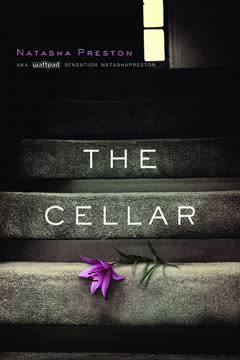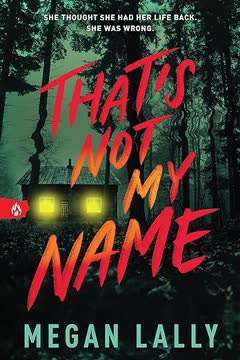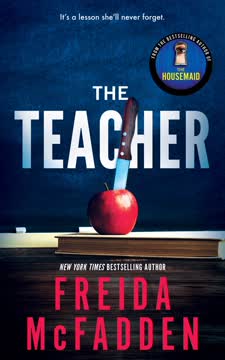Plot Summary
Ordinary Night, Shattered Life
Summer Robinson, a typical sixteen-year-old in a quiet English town, looks forward to a night out with friends. Her boyfriend Lewis and family worry about her walking alone, but Summer shrugs off their concerns. On her way to the club, she's approached by a stranger who insists she's "Lily." Before she can escape, he kidnaps her, dragging her into a van and driving her to an unknown location. Summer's world is upended in an instant, and she's thrust into a nightmare she never imagined possible.
The Cellar's Secret Family
Locked in a meticulously clean, lemon-scented cellar, Summer meets three other girls: Rose, Poppy, and Violet. Each has been renamed after a flower by their captor, who calls himself Clover. The girls explain the rules: never use your real name, always obey, and keep everything spotless. Clover wants a "perfect family," and the girls are his "flowers." Summer is told to forget her old life—her survival depends on it. The cellar is both prison and twisted home, and Summer must quickly adapt to its suffocating routines.
Rules, Roses, and Resistance
Summer struggles to accept her new reality. Rose, the longest captive, is almost eerily compliant, while Poppy and Violet show flickers of resistance. The girls are forced to maintain strict routines: cleaning, dressing up, and preparing meals for Clover, who visits twice daily. Any deviation or defiance is met with violence. Summer's hope for escape is met with warnings—others have tried and died. Yet, she quietly resolves not to give up, even as she's forced to play the role of "Lily."
Lewis: The Search Begins
Back in the outside world, Summer's disappearance devastates her family and boyfriend, Lewis. The police are slow to act, but Lewis, Henry (Summer's brother), and their families organize searches, distribute flyers, and pressure authorities. As days turn into weeks, hope wanes but never dies. Lewis is haunted by guilt and determination, convinced Summer didn't run away. The search becomes an obsession, and the community rallies, but the trail remains cold.
Survival and Submission
Inside the cellar, Summer learns the cost of resistance. Clover's punishments are swift and brutal—he controls every aspect of their lives, from hygiene to conversation. The girls are forced to adopt their flower names, erasing their identities. Summer witnesses the psychological toll on her fellow captives, especially Rose, who seems to have accepted her fate. Yet, beneath the surface, small acts of rebellion and hope persist, as Summer clings to memories of her old life and dreams of rescue.
The Flowers' True Names
Clover's obsession with purity and order extends to renaming his captives. Each girl's real name is replaced, their pasts erased. Summer is now "Lily," and the others have similarly lost themselves. The renaming is both a psychological weapon and a means of control. Yet, the girls secretly share their true names and stories, forging bonds that help them endure. Summer's determination to remember who she is becomes an act of resistance, even as she's forced to answer to "Lily."
Failed Escapes, Fatal Consequences
Violet, unable to endure further abuse, attempts an escape with Summer's help. Their plan fails, and Clover's response is merciless—he kills Violet in front of the others, forcing Rose and Poppy to clean up the aftermath. The horror of Violet's death shatters any illusion of safety and reinforces the consequences of defiance. Summer is traumatized but more determined than ever to survive and honor Violet's memory.
Clover's Twisted Logic
Chapters from Clover's perspective reveal his warped worldview. Scarred by childhood trauma and a controlling mother, he believes he's saving his "flowers" from a corrupt world. He justifies his actions as moral, targeting "impure" women and punishing those who threaten his family. His obsession with cleanliness, order, and control masks deep-seated rage and loneliness. Clover's delusions drive him to further violence, and his grip on reality frays as the outside world closes in.
The World Above Moves On
As months pass, the search for Summer becomes routine for her loved ones. The police find bodies in a canal, but none are Summer's. The community's attention wanes, but Lewis and Summer's family refuse to give up. The emotional toll is immense—guilt, grief, and hope intermingle. Meanwhile, Clover continues his double life, appearing normal to neighbors and coworkers, even as he commits further atrocities.
Violence, Control, and Compliance
Clover's need for control escalates. He punishes the girls for minor infractions, especially when his symbolic flowers die. The girls are forced to clean up after his murders, further traumatizing them. Summer is subjected to sexual violence, and the psychological scars deepen. Yet, the girls' solidarity grows, and small acts of defiance—remembering their real names, sharing stories—become lifelines.
Hope Flickers, Despair Grows
Lewis's suspicions turn to a local man, Colin Brown (Clover's real identity), but the police lack evidence. Summer's family struggles with despair, but new clues—like Summer's phone found near a canal—renew hope. Inside the cellar, Summer and Poppy plot quietly, waiting for Clover to make a mistake. The tension mounts as Clover grows increasingly paranoid, sensing the world is closing in.
The Search Narrows
Lewis and Henry break into Clover's house, finding women's clothes and evidence of other captives, but not Summer. The police remain skeptical, but mounting circumstantial evidence leads to a search warrant. Meanwhile, Clover's behavior becomes more erratic, and the girls sense a final confrontation is near. Summer's hope is rekindled, but fear of what Clover might do if discovered looms large.
The Breaking Point
As the police prepare to raid the house, Clover descends into madness. He decides the only way to keep his "family" together is to kill them all. He attacks the girls, stabbing Violet and Poppy. Summer and Rose fight back, and chaos erupts in the cellar. The police break in during the struggle, rescuing Summer and the surviving girls. Clover is arrested, his reign of terror finally ended.
The Final Confrontation
Summer awakens in the hospital, disoriented and traumatized. She struggles to reconnect with her family and Lewis, feeling more like "Lily" than Summer. Poppy survives, but Violet and Rose do not. The survivors grapple with guilt and grief, haunted by memories of the cellar. Clover is declared insane and committed to a psychiatric facility, his crimes exposed at last.
Aftermath and Recovery
Summer and Poppy (Becca) support each other as they try to rebuild their lives. Summer's relationship with Lewis is strained by trauma, but his patience and love help her begin to heal. The community mourns the lost girls, and Summer visits their graves, struggling with survivor's guilt. Therapy and time offer hope, but the scars of captivity remain.
Healing, Guilt, and Moving Forward
Summer and Becca forge a deep bond, united by shared trauma. They support each other through therapy, family gatherings, and attempts to reclaim normalcy. Summer's family and Lewis remain steadfast, but the journey to healing is ongoing. The memory of Rose and Violet lingers, shaping their understanding of survival and resilience.
The Meaning of Survival
Summer reflects on her ordeal, recognizing that survival is not just about escaping physical captivity, but reclaiming identity and agency. She acknowledges the darkness she endured, but also the strength found in friendship, love, and the refusal to be defined by trauma. The story ends with Summer choosing to live, love, and hope again, determined to honor the memory of those lost and to never let Clover's darkness define her future.
Characters
Summer Robinson ("Lily")
Summer is a typical teenager whose life is shattered by abduction. Her journey is one of psychological endurance, as she's forced to become "Lily" and submit to Clover's rules. Summer's core strength lies in her refusal to fully surrender her identity, even as she's traumatized by violence and loss. Her relationships—with Lewis, her family, and the other girls—anchor her, and her determination to survive, remember, and eventually heal is the heart of the story. Summer's development is marked by the tension between compliance for survival and the quiet rebellion of memory and hope.
Clover (Colin Brown)
Clover is a deeply disturbed man, shaped by childhood trauma and a controlling mother. He kidnaps and renames girls, seeking to create a "pure" family immune to the world's corruption. His obsession with cleanliness, order, and control masks profound loneliness and rage. Clover's psychological complexity is revealed in his alternating moments of charm, violence, and self-justification. He views his crimes as moral acts, unable to see the horror he inflicts. As the story progresses, his grip on reality weakens, leading to increasingly erratic and dangerous behavior.
Lewis
Lewis is Summer's anchor in the outside world. His love for her drives a tireless search, even as hope fades and the community moves on. Lewis's journey is one of guilt, frustration, and unwavering determination. He refuses to accept Summer's loss, pushing the police and risking his own safety to find her. After her rescue, Lewis's patience and understanding are crucial to Summer's healing, though their relationship is forever changed by trauma.
Rose (Shannen)
Rose is the longest-held captive, and her survival strategy is total compliance. She becomes a surrogate "big sister" to the others, teaching them the rules and routines. Rose's acceptance of her fate is both a coping mechanism and a sign of deep psychological damage. Her relationship with Clover is complex—she is both victim and, at times, enabler. Rose's ultimate fate underscores the cost of prolonged captivity and the difficulty of reclaiming identity after trauma.
Poppy (Becca)
Poppy is kind, nurturing, and deeply affected by guilt and regret. She bonds closely with Summer, and their friendship becomes a source of mutual support. Poppy's backstory of family estrangement and homelessness adds depth to her character. She is less compliant than Rose, but more cautious than Violet, and her journey is one of gradual empowerment. Poppy's survival is bittersweet, marked by loss and the challenge of rebuilding a life after horror.
Violet (Layal/Jennifer)
Violet is the most openly resistant of the captives, unable to fully submit to Clover's control. Her attempts to escape and fight back are met with fatal consequences. Violet's story is one of courage and desperation, and her death is a turning point for the others. She represents the cost of defiance in the face of absolute power, and her memory haunts Summer and Poppy.
Henry
Henry is Summer's older brother, whose relationship with her is marked by typical sibling rivalry and deep affection. He joins Lewis in the search, providing emotional and practical support. Henry's development is seen in his transition from annoyance to fierce protector, and his role in the aftermath is crucial to Summer's reintegration.
Daniel and Dawn
Summer's parents are devastated by her disappearance but remain steadfast in their search. Dawn's grief is raw and consuming, while Daniel channels his pain into action. Their unwavering love and support are vital to Summer's survival and recovery, though the trauma leaves lasting scars on the family.
Rachel and Kerri
Summer's friends represent the life she's lost and the world that continues without her. Their guilt and confusion mirror the community's response, and their eventual reunion with Summer is both joyful and fraught with the challenge of bridging the gap created by trauma.
The Police (Michael, et al.)
The police are portrayed as well-meaning but constrained by bureaucracy and lack of evidence. Their slow response and skepticism frustrate Summer's loved ones, highlighting the limitations of institutional support in cases of abduction.
Plot Devices
Dual Narration and Shifting Perspectives
The novel alternates between Summer's first-person account, Lewis's perspective, and Clover's chilling internal monologue. This structure immerses readers in the psychological realities of victim, rescuer, and perpetrator. The shifting perspectives build suspense, reveal hidden motivations, and create empathy for the characters' struggles.
Symbolism of Flowers and Names
Clover's renaming of his captives after flowers is a central device, symbolizing both his desire for purity and his erasure of their identities. The flowers themselves—kept in vases, wilting and dying—mirror the girls' own fragility and resilience. The act of reclaiming real names becomes an act of resistance and hope.
Foreshadowing and Repetition
The strict routines imposed by Clover foreshadow the consequences of deviation. Repetition of daily tasks, meals, and rituals creates a sense of claustrophobia and inevitability, while also highlighting the small acts of rebellion that keep hope alive.
Psychological Manipulation and Gaslighting
Clover's manipulation of the girls' identities, memories, and perceptions is a form of psychological torture. The gradual blurring of reality and compliance demonstrates the insidious effects of captivity and trauma.
Parallel Plots: Captivity and Search
The novel's structure interweaves the claustrophobic world of the cellar with the expansive, often fruitless search above. This parallelism heightens suspense and underscores the emotional gulf between victim and loved ones.
The Cellar as Microcosm
The cellar is both prison and perverse home, its cleanliness and order masking horror. It becomes a microcosm of control, resistance, and the struggle for identity, with every object and routine imbued with meaning.
Analysis
Natasha Preston's The Cellar is a psychological thriller that delves into the darkest corners of human experience—abduction, captivity, and the struggle to maintain identity under absolute control. Through the eyes of Summer, Lewis, and Clover, the novel examines the ways trauma reshapes the self, the power of hope and memory, and the resilience required to survive the unthinkable. The renaming of the girls and the symbolism of flowers highlight the tension between erasure and endurance, while the alternating perspectives create a multifaceted portrait of victim, rescuer, and perpetrator. The story's resolution is bittersweet—survival comes at a cost, and healing is a long, uncertain journey. Ultimately, The Cellar is a testament to the strength of the human spirit, the importance of connection, and the necessity of reclaiming one's story in the aftermath of horror. The novel warns of the dangers of complacency and the need for vigilance, empathy, and action in the face of evil, while offering hope that even in the darkest places, light can be found.
Last updated:
FAQ
Synopsis & Basic Details
What is The Cellar about?
- A Teenager's Abduction: The Cellar follows Summer Robinson, a typical sixteen-year-old, whose life is irrevocably shattered when she is kidnapped by a man who calls himself Clover. She is taken to a meticulously clean, underground cellar and stripped of her identity, renamed "Lily."
- A Twisted Family Unit: Summer discovers three other young women—Rose, Poppy, and Violet—also held captive and renamed after flowers. They are forced to live by Clover's strict, obsessive rules, maintaining a facade of a "perfect family" under constant threat of his unpredictable violence.
- Parallel Worlds of Despair: The narrative alternates between Summer's claustrophobic captivity and the desperate search efforts of her boyfriend, Lewis, and her family in the outside world, highlighting the stark contrast between their realities and the relentless passage of time.
Why should I read The Cellar?
- Gripping Psychological Thriller: The Cellar offers a harrowing, intimate look into the psychological impact of captivity, exploring themes of identity, control, and the human will to survive. Readers are drawn into Summer's desperate struggle to retain her sense of self amidst profound trauma.
- Deep Character Exploration: Beyond the suspense, the novel delves into the complex motivations of its characters, particularly the chillingly delusional captor, Clover, and the varied coping mechanisms of his victims, offering a nuanced study of human resilience and vulnerability.
- Emotional Resonance & Pacing: Natasha Preston masterfully builds tension and emotional depth through alternating perspectives, creating a fast-paced yet deeply affecting narrative that keeps readers on edge while exploring the profound bonds forged in extreme circumstances.
What is the background of The Cellar?
- English Small-Town Setting: The story is primarily set in a seemingly idyllic, "boring" English town called Long Thorpe, which initially lulls Summer into a false sense of security, making her abduction even more shocking and highlighting the vulnerability that can exist even in familiar places.
- Psychological Roots of Abduction: Clover's motivations are deeply rooted in childhood trauma, specifically his experiences with a controlling mother and a father who cheated with a "whore." This background fuels his obsessive need for "purity," control, and a "perfect family," which he attempts to create through abduction and psychological manipulation.
- Exploration of Societal "Impurity": Clover's warped worldview extends to a self-appointed mission to "cleanse" society of what he perceives as "dirty" or "impure" women, particularly prostitutes. This dark background element reveals his twisted moral code and justifies his violent acts in his own mind.
What are the most memorable quotes in The Cellar?
- "You are Lily now. Summer doesn't exist anymore.": This chilling declaration from Rose to Summer (Chapter 2) encapsulates the core theme of identity erasure and the psychological warfare waged by Clover, highlighting the immediate and profound loss of self that victims face.
- "He doesn't like when flowers die.": Poppy's explanation (Chapter 10) of Clover's bizarre obsession with the wilting flowers, juxtaposed with his casual violence towards human life, starkly reveals his profound mental illness and twisted sense of purity, making his actions even more disturbing.
- "I'm not the same Summer he fell in love with. I had nothing to offer him.": Summer's internal reflection (Chapter 34) post-rescue powerfully conveys the lasting psychological scars of trauma, illustrating the deep-seated feelings of worthlessness and altered identity that survivors often grapple with, even when reunited with loved ones.
What writing style, narrative choices, and literary techniques does Natasha Preston use?
- First-Person, Present Tense Immersion: Preston primarily uses a first-person, present tense narration for Summer, creating an immediate, visceral, and claustrophobic experience for the reader, mirroring Summer's trapped state and heightening the sense of urgency and fear.
- Alternating Perspectives for Depth: The novel strategically shifts to Lewis's and Clover's first-person perspectives, offering crucial insights into the outside search and the captor's disturbing psyche. This multi-faceted approach builds suspense, reveals hidden motivations, and provides a comprehensive, albeit chilling, understanding of the events.
- Sensory Detail and Emotional Intensity: Preston employs vivid sensory details, particularly the pervasive "lemon scent" of the cellar, to create an oppressive atmosphere. Her prose is direct and emotionally charged, focusing on the raw fear, despair, and fleeting moments of hope experienced by the characters, drawing readers deeply into their psychological states.
Hidden Details & Subtle Connections
What are some minor details that add significant meaning?
- The Empty Fourth Vase: Upon Summer's arrival, she notices four vases, one of which is empty (Chapter 1). This seemingly innocuous detail subtly foreshadows her designated place within Clover's "family" and his meticulous, almost ritualistic, approach to his captives, reinforcing his desire for a complete, symmetrical "collection" of "flowers."
- Clover's Accountant Profession: The revelation that Clover is an accountant for a law firm (Chapter 5) is a chilling detail. It highlights his ability to maintain a perfectly normal, respectable facade in the outside world, making his sadistic double life even more disturbing and emphasizing how easily evil can hide in plain sight.
- Lack of Sharp Objects in the Cellar: Summer quickly observes that everything in the cellar, from cutlery to cleaning tools, is plastic or dull (Chapter 3). This detail underscores Clover's absolute control and foresight, demonstrating his deliberate efforts to prevent the girls from harming themselves, each other, or him, thereby eliminating any means of escape or resistance.
What are some subtle foreshadowing and callbacks?
- Lewis's Overprotective Warnings: In Chapter 1, Lewis repeatedly warns Summer about walking alone at night, which she dismisses as "overprotective." This immediately foreshadows her abduction, making her later regret ("If I'd listened to him... then maybe I'd be at home right now") a poignant callback to her initial naivety and the shattering of her perceived safety.
- Clover's Mother's Influence: Throughout Clover's chapters, his deceased mother's voice and teachings are a constant presence, particularly her emphasis on "purity" and her disdain for "whores" (Chapter 9, 14). This subtly foreshadows his later violent acts against prostitutes and his obsessive need to control his "family," revealing the deep-seated psychological roots of his pathology.
- The Recurring Phrase "It's going to be okay": This phrase is repeated by Rose and Poppy to Summer (Chapter 2, 6, etc.) and later by Summer to the new Violet (Chapter 20). Initially a comforting reassurance, it subtly evolves into a coping mechanism, a form of self-deception, and a sign of the psychological conditioning the girls undergo, highlighting the insidious nature of their captivity.
What are some unexpected character connections?
- Clover's Parallel to Summer's Family Dynamics: Clover's desire for a "perfect family" (Chapter 2) is a twisted mirror of Summer's own family, who, despite their bickering and overprotectiveness, genuinely love and search for her. This unexpected parallel underscores the universal human need for connection, even when distorted by mental illness.
- The Unseen Bond with Past Victims: While the previous "Lily" and other victims are never seen alive by Summer, their presence is felt through the shared clothes, the empty vase, and the girls' hushed warnings (Chapter 2, 3). This creates an unexpected, tragic connection, as Summer inherits their fate and their struggle, making their experiences part of her own.
- Henry and Becca's Budding Relationship: Post-rescue, Summer notes the growing closeness between her brother Henry and Poppy (Becca) (Chapter 34). This unexpected romantic connection, born from shared trauma and the aftermath of their ordeal, offers a glimmer of hope and normalcy, showing how new bonds can form even in the shadow of immense suffering.
Who are the most significant supporting characters?
- Clover's Mother: Though deceased, Clover's mother is arguably the most significant supporting character, as her controlling nature and moralistic teachings profoundly shaped his psychopathy and his obsession with "purity" and "family" (Chapter 9, 14). Her influence is the unseen hand guiding his horrific actions.
- Harold Dane: This elderly neighbor, who briefly appears in Chapter 1, offers an ironic and chilling piece of foreshadowing with his warning to Summer about watching her drinks. His seemingly innocuous presence highlights the mundane setting from which Summer is snatched, making the sudden horror more impactful.
- The Unnamed Victims: The previous "Lily" and the other women Clover murders (Chapter 7, 13, 20) are crucial supporting characters, even in their absence or brief, tragic appearances. Their fates serve as stark warnings, driving the plot, deepening the girls' fear, and solidifying Summer's resolve to fight for survival.
Psychological, Emotional, & Relational Analysis
What are some unspoken motivations of the characters?
- Rose's Deep-Seated Compliance: Beyond mere fear, Rose's extreme compliance (Chapter 3, 6) stems from a profound psychological break, a complete surrender of her former identity (Shannen) as a survival mechanism. Her unspoken motivation is a desperate need for perceived safety and stability, even if it means embracing Clover's twisted reality and becoming his most loyal "flower."
- Poppy's Quiet Yearning for Normalcy: Poppy's past as a runaway (Chapter 15) makes her more adaptable to confinement, but her unspoken motivation is a deep yearning for the "normal" family life she never had. Her fantasy of a cottage and children (Chapter 19) reveals her desire for a conventional future, which subtly fuels her cautious hope for escape and her bond with Summer.
- Clover's Desperate Need for Validation: Clover's meticulous routines, his "gifts" of flowers and clothes, and his insistence on being a "family" (Chapter 2, 12) are driven by an unspoken, desperate need for validation and love, stemming from his traumatic childhood. He seeks to control and perfect his "flowers" as a means to heal his own deep-seated loneliness and prove his worth, particularly to his deceased mother.
What psychological complexities do the characters exhibit?
- Dissociation as a Coping Mechanism: Summer exhibits clear signs of dissociation, particularly her internal separation of "Summer" and "Lily" (Chapter 13, 19, 34). This psychological complexity allows her to mentally detach from the horrors inflicted upon "Lily," preserving a core part of "Summer" for survival, though it complicates her post-rescue reintegration.
- Stockholm Syndrome's Nuances: Rose's character (Chapter 6, 15) presents a complex portrayal of Stockholm Syndrome, where her compliance and apparent affection for Clover blur the lines between victim and enabler. Her psychological state is a chilling example of how prolonged trauma can warp perception and attachment, making her a tragic figure.
- Clover's Delusional Grandiosity: Clover's psychopathy is marked by delusional grandiosity (Chapter 8, 12), where he genuinely believes he is a benevolent savior "protecting" his "flowers" from a corrupt world. His inability to empathize or recognize the horror of his actions highlights a severe break from reality, making him a terrifyingly unpredictable captor.
What are the major emotional turning points?
- Violet's Brutal Murder: The first on-screen murder of Violet (Chapter 7) is a pivotal emotional turning point, shattering any remaining illusions of safety or easy escape for Summer. It transforms Summer's fear into a hardened resolve for survival, while also deepening her trauma and solidifying the brutal reality of Clover's power.
- Summer's Sexual Assault: The implied sexual assault (Chapter 17, 18) is a profound emotional turning point, leading to Summer's intense feelings of dirtiness, worthlessness, and a desperate need to "scrub" herself clean. This violation marks a new depth of trauma, forcing her to further dissociate and question her own identity and future.
- Lewis's Discovery of Summer's Phone: For the outside world, the discovery of Summer's phone (Chapter 22) is a major emotional turning point, shifting the search from a missing person case to a potential abduction/homicide investigation. It reignites Lewis's hope and determination, propelling him towards a more focused and desperate search for Colin Brown.
How do relationship dynamics evolve?
- Summer and Lewis: From Teenage Romance to Traumatic Bond: Their relationship evolves from a typical, affectionate teenage romance (Chapter 5, 18) into a bond profoundly tested by trauma. Post-rescue, their dynamic is strained by Summer's emotional numbness and Lewis's guilt, requiring immense patience and a redefinition of intimacy based on understanding and healing (Chapter 33, 34).
- The Girls' Forced Sisterhood: Initially strangers forced into proximity, the girls' relationship evolves into a complex, albeit forced, sisterhood (Chapter 2, 6). Shared trauma, mutual support, and the desperate need for connection forge deep bonds, transforming them into a makeshift family unit that provides solace and strength against their captor.
- Clover's Perverse "Family" Dynamic: Clover's relationship with his "flowers" is a perverse evolution of a family dynamic, where he acts as a controlling patriarch, demanding obedience and "love" (Chapter 12, 17). His "affection" is intertwined with violence and manipulation, creating a terrifying power imbalance where his victims are simultaneously cherished and brutalized.
Interpretation & Debate
Which parts of the story remain ambiguous or open-ended?
- The Full Extent of Clover's Victims: While Rose states Clover has killed "Eight since I've been here" (Chapter 9), the exact number of his victims and the full timeline of his crimes remain ambiguous. The discovery of multiple bodies in the canal (Chapter 22) suggests a larger, ongoing pattern of violence that extends beyond the immediate narrative, leaving readers to ponder the true scale of his depravity.
- Rose's True Psychological State: Rose's extreme compliance and almost maternal care for the other girls, coupled with her seemingly genuine affection for Clover (Chapter 6, 15), leaves her true psychological state open to interpretation. Is she a victim of profound Stockholm Syndrome, or has she developed a unique, almost spiritual, coping mechanism that allows her to survive by embracing her captivity?
- The Long-Term Impact on Summer's Identity: The ending suggests Summer's struggle to reconcile "Summer" and "Lily" is ongoing (Chapter 34). While she is physically free, the psychological scars and the fractured sense of self remain. The novel leaves open the question of whether she will ever fully reclaim her pre-trauma identity or if "Lily" will forever be an indelible part of who she is.
What are some debatable, controversial scenes or moments in The Cellar?
- The Depiction of Sexual Assault: The novel implies, rather than explicitly details, Summer's sexual assault by Clover (Chapter 17, 18). This choice can be controversial, with some readers arguing that it sanitizes the horror of the act, while others might find it a more sensitive approach that focuses on the psychological aftermath rather than graphic violence.
- Rose's Acceptance and Defense of Clover: Rose's consistent defense of Clover and her attempts to normalize their captivity (Chapter 6, 15) are highly debatable. Readers may find her character frustrating or even complicit, sparking discussions about the complexities of victim psychology, survival strategies, and the insidious nature of psychological manipulation.
- The Police's Initial Inaction: The police's initial skepticism and slow response to Summer's disappearance (Chapter 4, 11) can be a controversial point. While it serves to highlight Lewis's determination, it also raises questions about the efficacy of law enforcement in such cases and can be seen as a critique of systemic failures in protecting vulnerable individuals.
The Cellar Ending Explained: How It Ends & What It Means
- A Bittersweet Rescue and Its Immediate Aftermath: The story culminates in a chaotic rescue where police raid Clover's cellar during his final, murderous rampage. Summer and Poppy (Becca) survive, but Violet and Rose tragically die from their injuries (Chapter 31, 32). Clover is apprehended but deemed mentally unstable, leading to his commitment to a psychiatric unit rather than a criminal trial (Chapter 34).
- The Enduring Scars of Trauma: The ending powerfully conveys that survival is not a clean resolution. Summer struggles with profound emotional numbness, survivor's guilt, and a fractured identity, feeling more like "Lily" than her former self (Chapter 33, 34). Her relationship with Lewis, though loving, is irrevocably changed, requiring immense patience and understanding as they navigate the long road to healing.
- A Realistic Portrayal of Recovery and Hope: The novel concludes not with a "happily ever after," but with a realistic depiction of life after horror. Summer and Becca find solace and strength in their shared experience, supporting each other through therapy and the challenges of reintegration. The final scene at the graves of Rose and Layal (Violet) underscores the lasting impact of loss and the importance of remembering, while Summer's choice to live, love, and hope again signifies a resilient, albeit scarred, path forward.
Review Summary
The Cellar received mixed reviews. Some readers found it gripping and disturbing, praising its exploration of kidnapping and psychological trauma. Others criticized the writing as repetitive and underdeveloped, with flat characters and unrealistic plot elements. Many felt the ending was rushed and unsatisfying. Some appreciated the multiple perspectives and tense atmosphere, while others found the villain clichéd and the protagonist annoying. Overall, opinions were divided on whether it was an engaging thriller or a poorly executed concept.
Similar Books
Download PDF
Download EPUB
.epub digital book format is ideal for reading ebooks on phones, tablets, and e-readers.


















